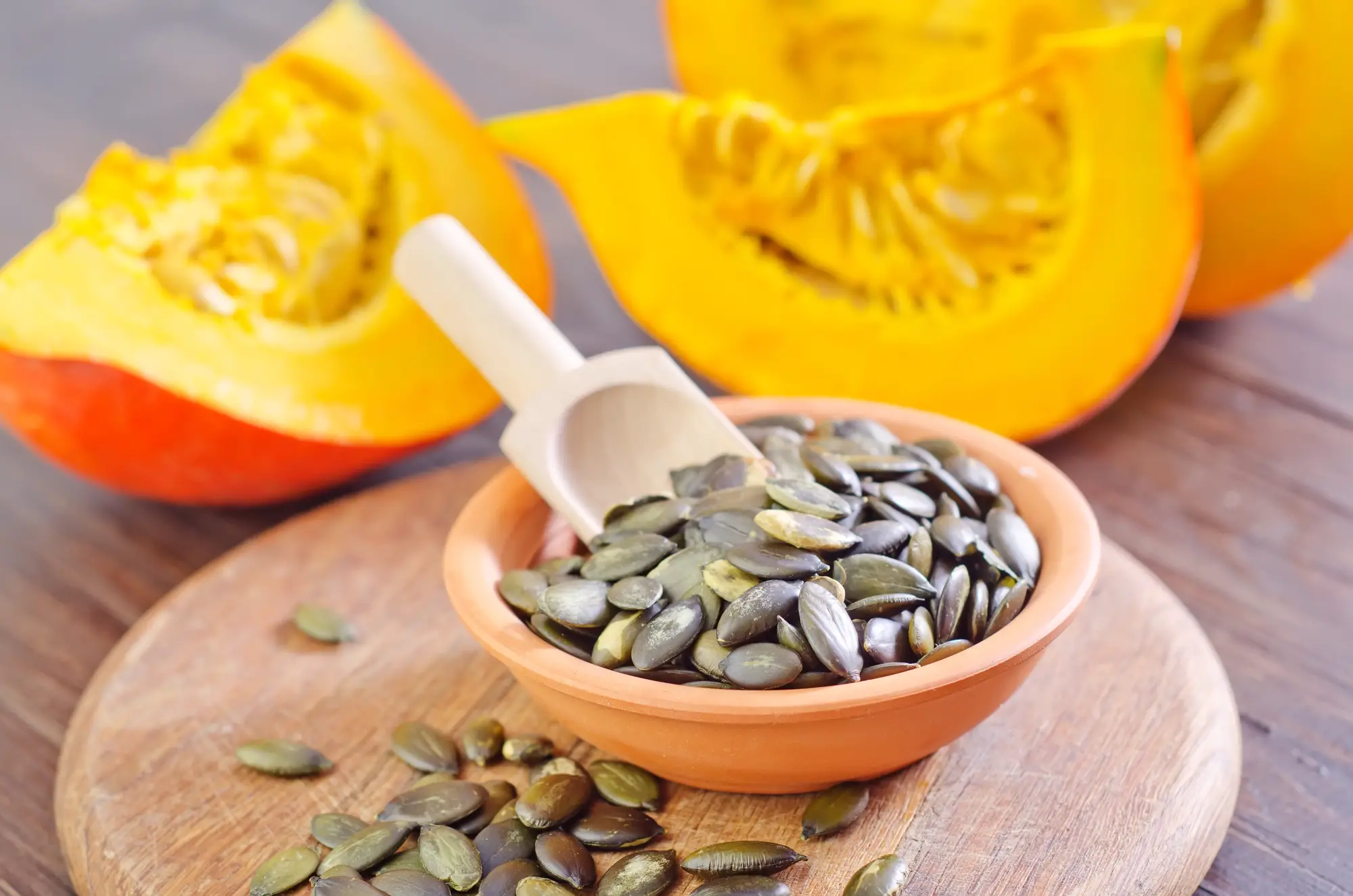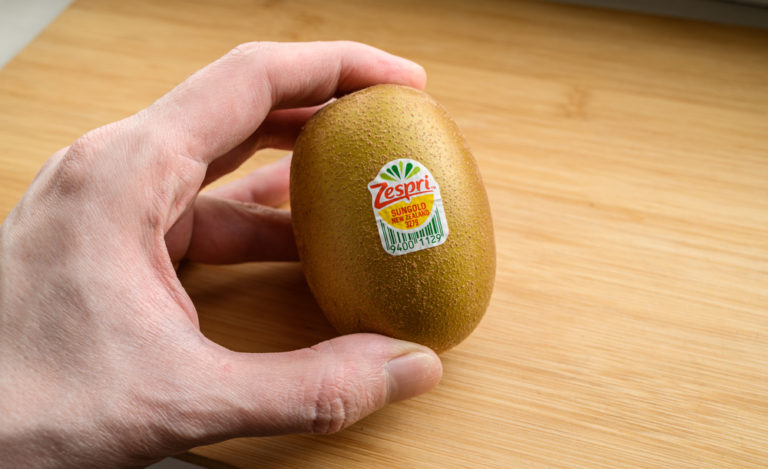It’s that season again when you encounter those plump, orange gourds in nearly every nook and cranny — adorning front porches, gracing pies and lattes, and even making spooky appearances in haunted houses.
Harvested in September and October, pumpkin holds a special place in the hearts of Americans during the autumn season and is also a staple symbol for Halloween celebrations. More than this, we all know how pumpkin is one of the most fascinating foods, from its flesh all the way down to its seeds, which serve as a nutritious snack.
Nutritional Value of Pumpkin Seeds
Pumpkin is a nutrient-dense vegetable that’s notably low in calories but packed with essential vitamins and minerals. One of its standout features is its high Vitamin A content, predominantly in the form of beta-carotene, which not only imparts its vibrant orange hue but also supports vision, skin health, and immune functions. In just 100 grams of raw pumpkin, there’s about 8500 IU of Vitamin A, making it a stellar source of this crucial nutrient. [1]
But the goodness doesn’t stop there. Pumpkins are also a decent source of Vitamin C, an antioxidant that plays a role in collagen synthesis and immune support. They offer a range of B-vitamins, including niacin, riboflavin, and Vitamin B6, which aid in energy metabolism and nerve function. On the mineral front, pumpkins bring potassium to the table, which is vital for heart health and muscle function. They also provide a sprinkling of minerals like magnesium, phosphorus, iron, and calcium, each contributing to various aspects of overall health. [2]
Despite its sweet flavor, pumpkin is relatively low in sugars and carbs, with only about 6.5 grams of carbohydrates per 100 grams, of which a significant part is dietary fiber, promoting digestive health. Moreover, they’re virtually fat-free, making them a versatile ingredient for those watching their calorie or fat intake. In essence, pumpkin’s nutritional profile makes it an excellent choice for a wholesome and balanced diet.
Health Benefits of Pumpkin Seeds
Whether you’re looking for an afternoon energy booster or a pre-workout snack, pumpkin seeds are a great option. Plus, it has amazing health benefits.
- Promotes Eye Health: Pumpkins are rich in beta-carotene, a precursor to vitamin A, which promotes healthy eyesight and reduces the risk of age-related macular degeneration.[3]
- Boosts Immune Function: The vitamins and minerals in pumpkin, including vitamin C and zinc, boost your immune system, helping your body fight off illnesses and infections.
- Supports Heart Health: The fiber, potassium, and antioxidants in pumpkin support heart health by reducing blood pressure, lowering cholesterol levels, and promoting overall cardiovascular well-being.
- Aids in Weight Management: Pumpkin’s low-calorie and high-fiber content aids in weight management by promoting a feeling of fullness.[2]
- Enhances Digestive Health: The fiber in pumpkin enhances digestive health, preventing constipation and supporting a balanced gut microbiome.[4]
- Nourishes Skin: Vitamins and antioxidants in pumpkin, such as vitamin E and beta-carotene, nourish the skin, protecting it against free radical damage and promoting cell renewal.[5]
- Reduces Inflammation: Pumpkin contains compounds that reduce inflammation, potentially lowering the risk of chronic inflammatory conditions.
- Improves Mood and Sleep: Pumpkin seeds, containing tryptophan, improve mood and support better sleep.[6]
- Supports Cancer Prevention: Pumpkin seeds are rich in phytochemicals and antioxidants that can reduce the risk of certain cancers by combating free radicals and protecting cellular DNA.
Incorporating pumpkin into your diet, whether through soups, roasted dishes, smoothies, or baked goods, can be a delicious and nutritious way to enjoy nutrient-dense food.

Recipe: Roasted Pumpkin Seed for Your Afternoon Snack
Incorporating pumpkin seeds into your culinary repertoire doesn’t have to be limited to mere snacking. But this time, let me share with you the common way we wanted to munch these seeds.
Ingredients:
- 1 cup pumpkin seeds, cleaned and dried
- 1 tablespoon olive oil
- Salt, to taste
- Optional seasonings: garlic powder, paprika, cayenne pepper, or your favorite spices
Instructions:
- Preheat the Oven: Preheat your oven to 300°F (150°C).
- Clean and Dry the Seeds: After scooping out the seeds from a pumpkin, rinse them in a colander under cold water to remove any pumpkin flesh. Pat them dry with a paper towel.
- Season the Seeds: In a bowl, toss the clean and dry pumpkin seeds with olive oil and a sprinkle of salt. If you’d like, add your favorite seasonings or spices to give them extra flavor.
- Spread on Baking Sheet: Spread the seasoned pumpkin seeds in a single layer on a baking sheet lined with parchment paper or a silicone baking mat.
- Roast in the Oven: Place the baking sheet in the preheated oven and roast the seeds for about 20-30 minutes, or until they turn golden brown. Stir them every 10 minutes for even roasting.
- Cool and Enjoy: Remove the roasted pumpkin seeds from the oven and let them cool on the baking sheet. They will become crispier as they cool down. Once cool, store them in an airtight container, and enjoy them as a snack or as a topping for salads, soups, or yogurt.
Feel free to experiment with different seasonings to create your own unique roasted pumpkin seed flavors.

Innovative Uses of Pumpkin Seed Oil Beyond the Kitchen
While many are familiar with pumpkin seed oil’s culinary delights, its versatility extends far beyond dressings and dips. The oil, derived from cold-pressing roasted pumpkin seeds, has a rich array of nutrients and compounds beneficial for skin, hair, and overall well-being. Let’s explore some innovative ways to incorporate pumpkin seed oil outside the realm of food:
- Skin Moisturizer: Rich in fatty acids and antioxidants, pumpkin seed oil can be used as a natural moisturizer. Apply a few drops to your face after cleansing for smooth, hydrated skin. Its non-greasy texture is suitable even for oily skin types.
- Hair Serum: The nutrients in pumpkin seed oil, particularly zinc and vitamin E, can boost hair health. Warm a few drops between your palms and run it through the ends of your hair to prevent split ends and give a shiny finish.
- Scalp Treatment: Massage pumpkin seed oil into the scalp to combat dryness and dandruff. It nourishes hair follicles, potentially supporting hair growth and thickness.
- Lip Balm: Blend pumpkin seed oil with beeswax to create a homemade lip balm. Its hydrating properties will keep your lips soft and moisturized.
- Massage Oil: Owing to its anti-inflammatory properties, pumpkin seed oil can be used as a massage oil, helping to soothe muscle aches and joint pains.
- Nail Strengthener: Rubbing pumpkin seed oil into your cuticles and nails can strengthen brittle nails, thanks to its rich content of zinc and essential fatty acids.
- DIY Face Masks: Combine pumpkin seed oil with ingredients like honey or yogurt for a nutrient-packed face mask. It can aid in reducing acne scars, toning the skin, and adding a healthy glow.
- Bath Oil: Add a few drops of pumpkin seed oil to your bathwater. It will leave your skin feeling soft and nourished, making for a relaxing and rejuvenating experience.
- Wound Healing: While it’s not a substitute for medical treatments, the antioxidant properties of pumpkin seed oil can support the healing process of minor cuts and scrapes when applied topically.
- Carrier Oil: In aromatherapy, pumpkin seed oil can be used as a carrier oil. Mix it with a few drops of your favorite essential oils to dilute them before applying to the skin.
My Personal RX: Tapping Into Nature’s Pharmacy
Throughout my years in the medical profession, I’ve continually been awed by the therapeutic prowess of nature. Beyond the confines of synthetic drugs, nature offers a vast pharmacy ranging from the dense forests to our very gardens. Take the pumpkin, for example – not only does its flesh nourish, but its seeds are a treasure trove of nutrients and health benefits. Here are my personally prescribed tips to maximize nature’s offerings.
- Embrace Whole Foods: Prioritize fresh fruits, vegetables, grains, and legumes in your diet. These are nature’s true medicines, brimming with nutrients and antioxidants.
- Opt for Organic: To reap nature’s benefits without the burden of harmful chemicals, choose organic produce. This ensures you aren’t consuming unwanted pesticides and herbicides.
- Minimize Processed Intake: The beauty of nature lies in its purity. Processed foods, with their long ingredient lists, often drift away from this natural essence.
- Expand Your Culinary Horizon: Dive into the Superfoods Cookbook. Discover recipes that celebrate superfoods, making healthy eating delightful and fun!
- Harness Nature’s Detoxifiers: Consider my Pure N- Acetyl Cysteine supplements. They’re nature’s answer to detoxification, bolstered antioxidant activity, and enhanced glutathione status.
- Educate Yourself on Ingredients: Whether it’s food or skincare, always be an informed consumer. Knowing what goes into what you consume or apply is crucial.
- Quench with Clean Water: Nature’s simplest offering, water, can be the most transformative. Ensure it’s pure, filtered, and free from contaminants.

Sources:
- Ldn, C. C. R. (2023). Pumpkin: a nutritional powerhouse and culinary delight. beginwithinnutrition.com. https://www.beginwithinnutrition.com/ingredients/pumpkin/
- Batool, M., Ranjha, M. M. a. N., Roobab, U., Manzoor, M. F., Farooq, U., Nadeem, H. R., Nadeem, M., Kanwal, R., AbdElgawad, H., Jaouni, S. K. A., Selim, S., & Ibrahim, S. A. (2022). Nutritional Value, Phytochemical Potential, and Therapeutic Benefits of Pumpkin (Cucurbita sp.). Plants, 11(11), 1394. https://doi.org/10.3390/plants11111394
- Pumpkin picking for eye health. (n.d.). AOA. https://www.aoa.org/news/clinical-eye-care/health-and-wellness/pumpkin-nutrition-benefits
- Jun, H., Lee, C., Song, G., & Kim, Y. (2006). Characterization of the pectic polysaccharides from pumpkin peel. LWT, 39(5), 554–561. https://doi.org/10.1016/j.lwt.2005.03.004
- Lobo, V., Patil, A., Phatak, A., & Chandra, N. (2010). Free radicals, antioxidants and functional foods: Impact on human health. Pharmacognosy Reviews, 4(8), 118. https://doi.org/10.4103/0973-7847.70902
- Roy, S. (2020, February 26). Pumpkin Seed-Based drink reduces time awake due to insomnia, study finds. Sleep Review. https://sleepreviewmag.com/sleep-disorders/insomnia/pumpkin-seed-based-drink-reduces-time-awake-due-insomnia-study-finds/




















